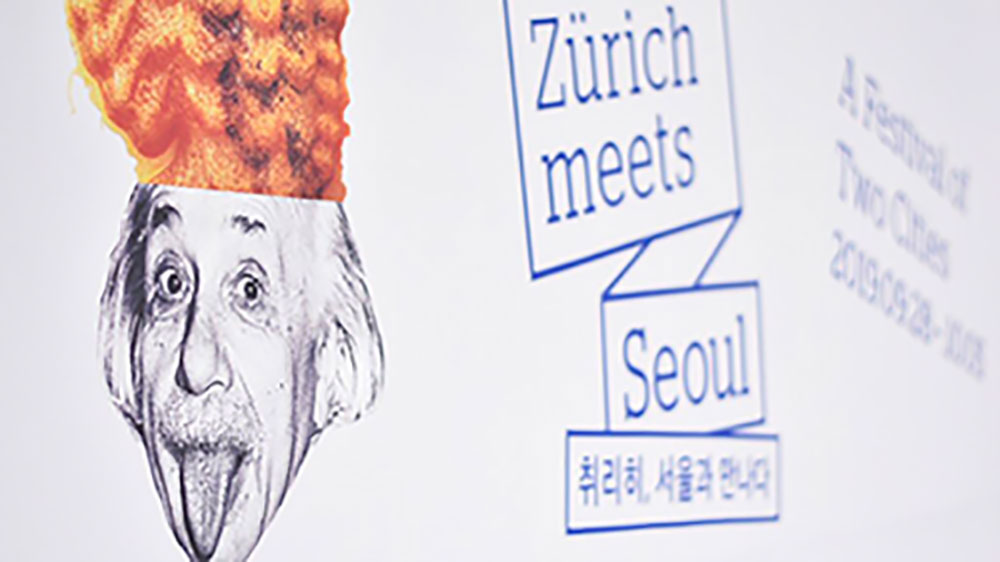Seoul Calling

In the last five years, the University of Zurich has published more than 900 co-publications with academic institutions in South Korea. Over 70 students from Korea have spent an exchange semester at UZH or vice versa.
These existing partnerships with Korean universities are now being deepened and expanded: At the science and culture festival “Zurich meets Seoul”, researchers from both cities met to explore and illuminate current issues from an academic perspective, and to discuss possible joint research cooperation opportunities. The festival was jointly organized by the Canton of Zurich, the City of Zurich and Zurich Tourism together with the Zurich universities.
International blockchain hubs
A core topic that links both cities is the development of blockchain technologies. Seoul is, like Zurich, one of the biggest international blockchain hubs: “In the region of Zurich and Zug alone, there are around 800 companies developing blockchain technologies,” says Claudio Tessone, director of the UZH Blockchain Center.
Wide application in industry
Blockchain has potential applications in a wide variety of sectors. One of its central features is that the data are distributed decentrally on many different computers, where they are stored, timestamped and can no longer be changed.
They can thus serve not only as the basis for cryptocurrencies, but also, for example, to control supply chains, such as in the diamond trade or for organic foodstuffs, or to ensure that subsidies go to the right places.
A current UZH research project – the “Car Dossier” – uses blockchain to store all data about a car, from the date of its production until it is recycled. The usual asymmetry of information between seller and buyer when trading a used car can thus be eliminated.
Just the start
While the positives are manifold, it became clear from the lectures and discussions in Seoul that there are still many open questions. Representatives from start-ups based in Zurich and Seoul are euphoric about the possibilities, while the academics tend to believe there is still much room for improvement, for example in terms of speed and security.
"Blockchain has flipped the usual process between academia and practice on its head,” observed Professor Sooyong Park, head of the Blockchain Research Center at Sogang University in Seoul. “Often applications are developed by industry on the basis of academic research. But with blockchain technologies, practitioners are developing them and we are then researching them. From the academic point of view, a solid basis is therefore lacking.”
More than technical questions
UZH Vice President Christian Schwarzenegger stressed the importance of discussing the subject of blockchain from various angles, not just from the technological perspective. “We also need to clarify regulatory questions and examine the economic and social mechanisms.” The UZH Blockchain Center was thus founded in order to look at the topic from the perspective of a variety of disciplines. It is one of the largest such initiatives in Switzerland.
Smart Cities
Another hot topic was “Smart Cities”, which was on the agenda as part of the Seoul Smart City Summit 2019. With the construction of a national 5G network, Korea is one of the first countries worldwide to lay the foundations for the Internet of Things, a concept that comprises self-driving vehicles, intelligent houses and cities, digital identities, and payment systems.
The business delegation of Zurich meets Seoul, in which the UZH Faculty of Business, Economics and Informatics took part, visited various technology companies who presented their solutions and visions, including SK Telecom and the Samsung Medical Center.
Social and political aspects still neglected
But the process of implementing digital technologies into “Smart Cities” has neglected to address societal and political aspects, claimed UZH political scientist Daniel Kübler. He led a workshop highlighting the democratic and regulatory challenges.
In particular he reflected on the consequences of private companies such as AirBnB or Uber practically having a total monopoly on basic data. “These data form the basis for decisions on transport or housing policy. Can the state still represent the interests of its citizens if it does not have access to such data?”
Kübler also pointed out the political side effects of certain apps, which are hardly ever mentioned: “Will traffic planning become obsolete if apps show us detours? How can politics represent our interests if we can submit our concerns online to the political administration instead of taking the traditional democratic routes? These are the questions that we want to research.”
Regulation with space for innovation
At the same time, the example of Uber shows that consumers do benefit considerably from new business models, for example in the form of lower prices and better service also from traditional taxi companies. Over-regulation would therefore be counterproductive. Professor Young Sung Lee of Seoul National University stressed: “The demand for intelligent technologies is there. Yes, we should regulate the use of technologies, but we should do it in such a way that we keep the advantages.”
Climate change and space research
At the third academic event of Zurich meets Seoul, led by environmental scientist Gabriela Schaepman-Strub and astrophysicist Jaiyul Yoo, it quickly became clear that there were many potential areas in which the two cities could collaborate on research in the natural sciences, or strengthen existing cooperation projects.
Both Switzerland and South Korea are members of the International Arctic Science Committee, and observers in the Arctic Council. In her research, Schaepman-Strub investigates the effects of climate change on the arctic, and uses the rapidly growing technological possibilities offered by satellite programs.
While Schaepman-Strub views the earth from above, Jaiyul Yoo of South Korea looks out into space. He uses optical astronomy to research galaxies far far away, and adopts projections from theoretical and observational cosmology to model the original conditions of the Big Bang. He studied at Seoul National University and wanted to use the Zurich meets Seoul event to initiate a possible cooperation.
“It is extremely valuable to do research work in mixed international teams, because each team member brings a different perspective,” stresses Gabriela Schaepman-Strub.